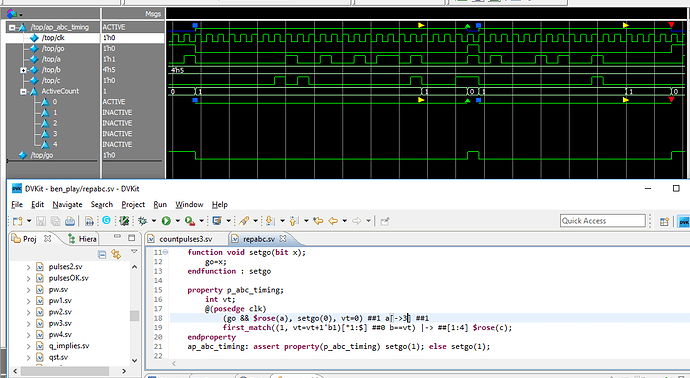In reply to muralidar:
In reply to ben@SystemVerilog.us:
I have a common clk for all 3 signals(a,b,c) of same module.
[Ben] Thus, as you know, with a clock, SVA samples the signals in the Preponed region (i.e., a delta time just before the edge of the clock).
My requirement is that signal a repeats for 3 times but not for every clk then i need to wait for delay of value b then c signal should start rising from 0 to 1.
[Ben] I hope that you studied SVA, because, if you did, you will recall the The goto repetition operator (Boolean[->n]) allows a Boolean expression (and not a sequence) to be repeated in either consecutive or non-consecutive cycles, but the Boolean expression must hold on the last cycle of the expression being repeated. The number of repetitions can be a fixed constant or a fixed range.
The signal a sample on posedge clk but repetition of signal a is not dependent on clk.
[Ben] that part is ambiguous; how can “a” be both generated off of a clock, but yet not be dependent on a clock. Maybe what you mean is that “a” is synchronous to a clock, but can repeat at different cycles, or th repeat is not consecutive (e.g., 1 0 0 1 1 0 0 0 0 1).
the second/ occurrence of signal a may happen after more no of clks(ex: 4/5/6). basically we should not be dependent on clk while checking signal for repetition.
[Ben] Again the contradiction! SVA IS dependent on the clock and the sampling of the signals are in the Preponed Region. I think that what you mean is that the occurrences of “a” at not necessarily consecutive.
I have written something like this: But it results in below compilation Error.
Can you please correct me if iam doing some thing wrong.
property a_b_c_timing;
@(posedge clk)
@(posedge a)
(a[*4]) b |-> $rose(c)
endproperty
assert_a_b_c_timing_chk: assert property(a_b_c_timing)
[Ben] Your assertion is complex. I took a stab at it.
Full simulation model is at http://SystemVerilog.us/vf/repabc.sv
Pertinent code:
function void setgo(bit x);
go=x;
endfunction : setgo
property p_abc_timing;
int vt;
@(posedge clk)
(go && $rose(a), setgo(0), vt=0) ##1 a[->3] ##1
first_match((1, vt=vt+1'b1)[*1:$] ##0 b==vt) |-> ##[1:4] $rose(c);
endproperty
ap_abc_timing: assert property(p_abc_timing) setgo(1); else setgo(1);
Assertion says: if(rose(a), disable other starts of “a” with the go.
then wait for 3 occurrences of “a”, then start count variable vt until vt==b.
Then wait for 1 to 4 cycles for rose(c).
if assertion pass or fails, set go to 1 to enable other starts.
The first_match() is needed because of the ##[1:$]
Change what you need to match your requirements.
Simulation results
Ben Cohen
http://www.systemverilog.us/ ben@systemverilog.us
- SVA Handbook 4th Edition, 2016 ISBN 978-1518681448
- A Pragmatic Approach to VMM Adoption 2006 ISBN 0-9705394-9-5
- Using PSL/SUGAR for Formal and Dynamic Verification 2nd Edition, 2004, ISBN 0-9705394-6-0
- Real Chip Design and Verification Using Verilog and VHDL, 2002 isbn 978-1539769712
- Component Design by Example ", 2001 ISBN 0-9705394-0-1
- VHDL Coding Styles and Methodologies, 2nd Edition, 1999 ISBN 0-7923-8474-1
- VHDL Answers to Frequently Asked Questions, 2nd Edition ISBN 0-7923-8115
